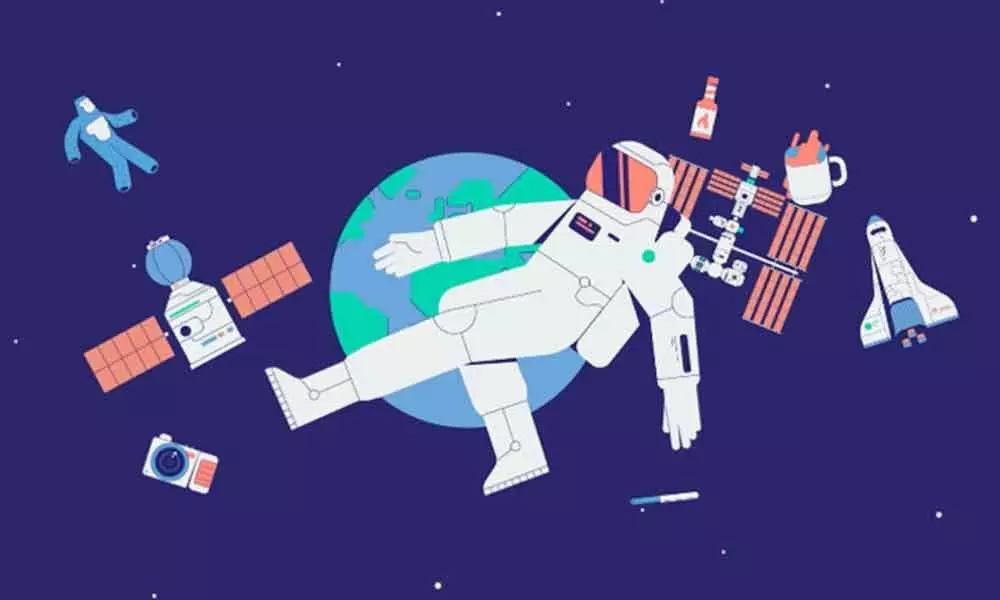Live
- Study Reveals Teabags Release Billions of Microplastics and Nanoplastics, Entering Your Body
- Kumbh Mela 2025: Essential Guide to Comfortable and Respectful Attire for Maha Kumbh
- Hyderabad Real Estate Faces Setback: Property Sales Drop 7% Year-on-Year in 2024
- Gnani’s Gen AI Solutions Revolutionising BFSI
- Trump's WHO threat sparks debate on the efficiency of global health governance
- ICC Champions Trophy 2025 Schedule: India vs Pakistan Match Set for February 23 in Dubai
- Champions Trophy 2025: Full Schedule, Match Dates, Venues, Timings, and Updates
- FRAI Urges Government to Provide Technology Platform for Kirana Stores to Stay Competitive
- Not just Gen Z, millennials too: Redditors discuss the wave of pet parenthood embraced by young Indians
- Innovation can expedite the journey to a Smoke-Free future- in focus at Technovation Abu Dhabi
Just In
New Delhi: Indian kids need non-competitive spaces for learning new skills, says former NASA engineer


Children in India need a non-competitive environment for learning skills suited for future space exploration, according to a former NASA engineer.
New Delhi: Children in India need a non-competitive environment for learning skills suited for future space exploration, according to a former NASA engineer. "To learn skills needed for current trends in modern space exploration, it is important that kids learn to make mock-ups early in school," noted David Cheuvront, a retired engineer at NASA Johnson Space Center in the US. These mock-ups using simple, easily available building materials like cardboard are a means of expressing engineering design, he said.
"This way, kids learn to make honest evaluations of materials, designs, check their usability, they learn to draw, there is 3D modelling, sometimes there is written requirement where they need to describe things," Cheuvront told PTI. Cheuvront was in India last month to interact with the students of Shiv Nadar School in Noida, Uttar Pradesh. The former NASA engineer explained that while participating in such model-building exercises, children describe things they need, and look for the right words for each of them.
"The critical Issue with what's going on with Indian education is what I call 'chalk and talk'," said Australian astronomer Sam Gibbs, an amateur astronomer and science educator, who was also one of the experts interacting with the students. Gibbs pointed out that in India there is a deficit of skills-development education among kids pursuing Science, Technology, Engineering, Arts and Mathematics (STEAM) fields.
According to Gibbs, the teaching approaches of schools in India depend a lot on textbooks, which needs to be immediately addressed. For kids to become successful in STEAM, Cheuvront added, their education needs to focus on three things -- skills, skill development, and skill development happening in a non competitive environment. "This emulates to some extent, what everybody does in creative fields," Gibbs added. "Our hope is to give students the chance to do what they expressively manage to do in their own special way and learn skills at the same time. "And we hope to connect with engineering and science and art that through a non-competitive event," he said.
For improving kids' education to be in line with modern trends in space exploration, Gibbs and Cheuvront said increasing childrens' participation in amateur astronomy is the key.
"Amateur astronomers are making several important contributions. With open databases, amateur astronomy has become a very innovative field, with schools for instance participating in things like developing robots for astronomy," Gibbs said. "There's a series of robotic telescopes around the world that anybody can access. It brings in a very diverse participation from schools across the world," he added. Both Gibbs and Cheuvront believe that schools in India need to start building skills-based education using these freely available astronomy resources.
"Provide exposure to students with project-based work and get them out of the classrooms to a creative space where they learn skills that complement what they learn in their academic studies," Gibbs said. Chevrount pointed out that the industrial and corporate sectors now increasingly look for people with special skills and talent.
"If you're someone who pushes straight A grades across the counter, it's generally not enough these days to get the job you want, especially in the space industry," Chevrount said. He added that it is also very important for kids to learn to collaborate in a group like in a working organisation. "That's something they don't normally get in a school," Chevrount said. According to the scientist, children should not just be engaged in rote-learning, or trying to do things in only the way they have been taught.
"That will not help the kids keep up with what's happening in the world right now," he said. For example, we are seeing within the rocket industry how they are doing new things and solving new problems like how SpaceX is developing its reusable rockets," Chevrount added. If humans are to colonise and get water from the moon to refuel the rockets and landers, over and over, instead of throwing them away after one use, more skill-based creative learning is needed, the former NASA engineer said.

© 2024 Hyderabad Media House Limited/The Hans India. All rights reserved. Powered by hocalwire.com






